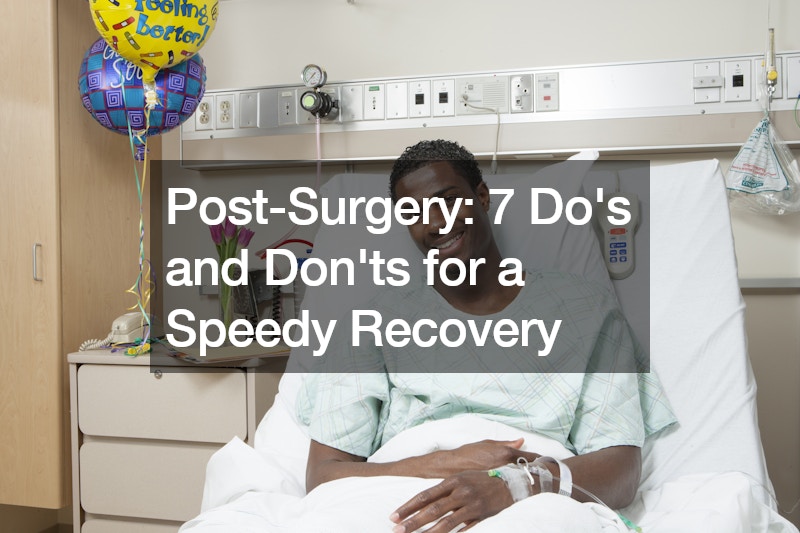

Undergoing surgery is a significant event that requires careful consideration not only during the procedure itself but also in the crucial post-operative period. Your body’s ability to heal and recover effectively depends largely on how well you adhere to the recommended post-surgery guidelines. To ensure a smooth and speedy recovery, here are seven essential do’s and don’ts to keep in mind:
1. Do Take Pain Medication as Advised
Pain management is crucial following surgery. While it may be tempting to tough it out and avoid medication due to potential side effects, it’s important to follow your doctor’s recommendations.
Pain medication not only alleviates discomfort but also enables you to stay mobile and active during your recovery, reducing the risk of complications such as blood clots. However, it’s essential to adhere strictly to the prescribed dosage and frequency to avoid adverse effects.
2. Do Be Wary of Infections
Surgical incisions create a pathway for potential infections, making it imperative to keep a close eye on your wound during the recovery process. Signs of a healthy healing process include mild soreness, itching, and slight discharge. However, any indication of pus, fever, or excessive bleeding warrants immediate medical attention as they could signal an infection. Keeping the wound clean and dry as per your surgeon’s instructions can significantly reduce the risk of complications.
In addition to keeping your surgical wound clean, practicing proper hand hygiene is crucial in preventing infections. Wash your hands thoroughly with soap and water before and after touching your incision site or changing dressings. If soap and water are not available, use an alcohol-based hand sanitizer to effectively kill germs. Avoid touching the incision unnecessarily, and ensure that anyone assisting with your wound care also follows strict hand hygiene practices.
3. Do Take Antibiotics
Antibiotics are often prescribed post-surgery to prevent infections from taking hold. Even if you start feeling better, it’s essential to complete the full course of antibiotics as directed by your healthcare provider. Completing the prescribed regimen helps ensure that any potential infection is thoroughly eradicated, minimizing the risk of complications and promoting a smooth recovery.
4. Do Not Lift Heavy Objects Until You Are Allowed To
Engaging in heavy lifting too soon after surgery can jeopardize your recovery and even lead to complications. Even if you feel capable, it’s crucial to adhere to the weightlifting restrictions imposed by your surgeon until you receive clearance. Exerting yourself prematurely can strain healing tissues, increase the risk of re-injury, and prolong your recovery time. It’s better to err on the side of caution and follow your doctor’s orders diligently.
If you require assistance with daily tasks, seek help from a home health agency that can provide trained professionals to help with these activities. Home health agencies offer services tailored to your specific needs, ensuring that you can maintain your recovery progress without putting yourself at risk. By utilizing their support, you can focus on rest and rehabilitation while minimizing the chances of setbacks or complications. Always prioritize your safety and follow the guidance of your healthcare team to achieve the best outcomes post-surgery.
5. Do Not Smoke
Smoking poses significant risks to post-surgery recovery. It impairs oxygen transport in the body, hindering the healing process and increasing the likelihood of complications such as delayed wound healing and infections. Quitting smoking, or at the very least refraining from it during the recovery period, can significantly improve your body’s ability to heal and reduce the risk of post-operative complications.
6. Don’t Start Driving Right After the Surgery
Anesthesia administered during surgery can impair your motor skills and decision-making abilities for a significant period afterward. Driving too soon after surgery not only puts you at risk but also compromises your safety and the safety of others on the road. It’s essential to heed the advice to refrain from driving until you have fully recovered and are no longer under the influence of anesthesia.
7. Don’t Get Constipated
Gastrointestinal surgery, in particular, can increase the risk of constipation, which can exacerbate discomfort and impede the healing process. It’s crucial to maintain regular bowel movements by staying hydrated, eating fiber-rich foods, and, if necessary, taking prescribed laxatives or stool softeners. Remember that excessive consumption of processed foods and sugary snacks can contribute to digestive issues and sluggishness. By prioritizing hydration and nutrition, you can support your body’s healing processes and reduce the risk of complications such as constipation.
In conclusion, proper post-surgery care is paramount to ensuring a speedy and successful recovery. By following these seven do’s and don’ts diligently, you can minimize the risk of complications, promote optimal healing, and expedite your return to health and normal activities. Always consult with your healthcare provider for personalized guidance and support throughout your recovery journey.
.

